Nerine Dorman's Blog, page 95
July 27, 2012
The Blackfeather Chronicles, excerpt 3 #fridayflash
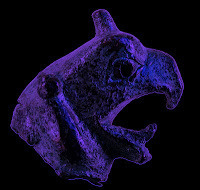 This is my continued light fantasy WiP, The Blackfeather Chronicles, which should appeal to fans of Mercedes Lackey and KJ Taylor. Yes. Talking griffins.
This is my continued light fantasy WiP, The Blackfeather Chronicles, which should appeal to fans of Mercedes Lackey and KJ Taylor. Yes. Talking griffins.Excerpt 1
Excerpt 2
The Surabi villa and its surrounding estate was my whole world and, one where I was loved and accepted unconditionally. I suppose in hindsight I might add that I was a pampered and oft-indulged curiosity, but who am I to complain? After all, I was the only griffin anyone knew. Within five summers I filled out, growing from the size of a housecat to that of an overly large wolfhound, though far more streamlined. Being of the tribe of Ravenkin, I was black and glossy, my eyes beady and my beak a sabre made for stabbing.
Although I knew I should try and indeed could fly if I put my heart and mind to it, I didn’t. Sure, I managed a brief burst of speed followed by an ungainly hop into the air, to glide for several feet, but I never put more effort into it.
Frankly, the idea of the earth falling away beneath me frightened me beyond all belief, and by that stage I’d certainly read enough from the Surabi family library to know that not all alchemical beasts could fulfil their composite natures. I had no desire to find out whether I could overcome the earth’s call. And, besides, Anwyn wasn’t built to fly, and my place was by her side.
At eighteen she was considered old—too old to still be considered marriageable—but she insisted that none of the young men her father proposed, were any good. In private she confided her very real fears that these men sought her hand only to merger their businesses’ interests.
* * * *
“I don’t like him,” Anwyn whispered to me.
We were in the botanical gardens attached to the Temple of Zenu, Goddess of love—and warfare.
Benedictus was deep in conversation with a pair of young men who’d approached him here, of all places, to discuss a recent shipment of barbarian prisoners of war.
Of course I wouldn’t reply to her, not here where there were perhaps dozens of curious ears to overhear our conversation, but I cocked my head and gave a soft snort. Anwyn’s smile was wan. We’d discussed numerous times how she wanted to eventually take over her father’s estate and not hand it over to some upstart who’d expect her to produce an heir almost immediately. I also knew she was afraid—very, very afraid—of giving birth.
The men laughed at some remark Benedictus made, and a small flock of fireflits took wing, obviously startled by the disturbance. Anwyn sighed and seated herself on the edge of the fountain. Above her, Zenu poured endless stream of water from one of her bowls, and a fireflit alighted on the goddess’s head, chirped once then spread its membranous wings, half-ready to take to the air again.
“If only we didn’t have to deal with these men,” Anwyn murmured. “They make me so tired. So full of bluster.” She absently stroked my head.
I sighed and closed my eyes, content to feel the sunlight on my plumage the shivers of Anwyn’s touch. This was enough for me, to know that we were together—a well-trained griffin and his mistress.
“Must you fawn over that creature so?” Benedictus stood before us, his face slightly flushed. His friends were departing and it was clear, from the way he stood with his arms folded over his chest, that something annoyed him.
Anwyn got to her feet, and a prickle of her annoyance communicated itself to me. I couldn’t help it—my hackles rose and I growled, low and deep in my chest.
Benedictus glared at me. “That thing’s too big and dangerous for a woman to consider a pet. It belongs in the circus.”
The sharp crack of Anwyn’s palm on Benedictus’s cheek made me jerk but when he swung back an arm to strike her, I moved fast. With a suddenness that surprised even myself I rose on my hindquarters, gripped the man by his shoulders and shoved him over, my beak inches from his face. His fear was a powerful intoxicant and he lay there, dazed, for a few seconds until he gathered his scattered wits. I could so easily...
“Silas! Heel!” Anwyn cried.
I obeyed, but I did not let my hackles down, nor did I stop growling, my wings half unfurled so as to include my mistress within the arc of my protection. The bastard! He must not touch my lady.
Benedictus lay there frozen in fear and, judging by the sharp stink in the air, had soiled himself.
Anwyn placed her hand on my head. “Enough now, Silas. I don’t think he’ll try to harm me again.” Her voice shook, however, and her fear and shock thrilled through her. And something else—power. We knew, without speaking, that when we were together, no man might challenge her.
Slowly Benedictus picked himself up. His friends of earlier were nowhere to be seen. If they’d turned to witness this altercation, they’d now proved themselves true fair-weather friends by making themselves scarce. He was on his own, and he knew it.
“I’ll make sure that you and that beast are destroyed for this!” he said, shaking.
“You’ll do no such thing,” a woman said behind us.
We turned to see one of the priestesses. She was an older woman, her iron-grey hair braided with amethysts and strings of pearls, her eyes clear as she regarded us.
“I saw and heard everything, Benedictus, son of Batravian. No one will gainsay a Priestess of Zenu in her own sanctuary. You have dishonoured the Goddess by raising a hand to a woman here. Leave now and do not consider any retaliation. Indeed, if you are wise, you shall seek to make some amends. Our temple always welcomes gifts and you appear to require some indulgences from the gods when it comes to matters of the heart.” Although she smiled, none of the humour reached her eyes.
I hadn’t thought it possible for Benedictus to grow paler, but he did. His mouth opened and shut a few times but no sounds came out. Then he gathered his stinking toga to him and scuttled from the courtyard.
The woman turned her gaze toward us and I was immediately struck by the sense of grace and power she possessed. I went down on my belly before her, and laid my head by her feet. This felt like the most natural gesture ever. Similarly, Anwyn bowed her head and went to her knees before the holy woman.
“Rise, my children,” the priestess said, and I felt a light touch to my head.
Tears shone in Anwyn’s eyes. From what I knew of human customs, the priestesses rarely, if ever entered the courtyard to mingle with supplicants. If anything they might send their handmaidens to minister to visitors, but never one of the holy ones themselves.
“Your holiness, I thank you,” Anwyn said as we rose to our feet.
The woman smiled and raised a hand in a dismissive gesture. “It’s nothing. Come, we shall refresh ourselves with something to drink. I would like to see for myself this griffin that’s been the talk of the city.” She gathered her stola and arranged her palla—which shimmered with the feathers of peacocks, and inclined her head so that it was clear we must follow her up the stairs and into the sanctuary.
Anwyn and I shared a brief look before we obeyed. We did not see anything particularly special or out of the ordinary about me being a griffin. As far as I was concerned, I ate and shat just like any other creature. But by the same measure, we weren’t about to decline an invitation to visit with the servants of a deity either.
Published on July 27, 2012 15:06
July 25, 2012
Let the Right One In #review
Title: Let the Right One In
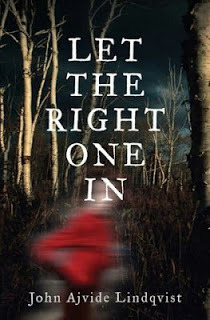 Author: John Ajvide Lindqvist
Author: John Ajvide LindqvistPublisher: Quercus, 2007
Buy link
Oskar, a 12-year-old boy in the Swedish suburb of Blackeberg, has problems. He puts up with severe bullying at school and is socially withdrawn. The large support cast is varied and just as defective as the boy. Readers are introduced to the dysfunctional relationship between the alcoholic Lacke and Virginia, as well as the murderer, and the rather pitiful Eli, and a host of others, all of whom go through their day-by-day existence.
Lindqvist paints a bleak picture, of ordinary folk dulled by the mundane, all of whom have potential that has been eroded by routine, dreams discarded and the passive acceptance of their lot within a society that grinds along. Yes, there is something fundamentally and profoundly depressing by all this, and in this lies the true horror of Let the Right One In—not so much the horrors people perpetrate on each other.
In a sense this novel is a coming-of-age story for Oskar, and the complex relationship he has with Eli, whom I can only picture as a sort of warped anima/animus figure. This is a love story too, about two isolated people who forge a deep regard for each other despite their vast differences. Yet while this is admirable, Lindqvist does not steer away from the unnaturalness of this situation.
Perhaps what I appreciated about the story is how at first Lindqvist introduces a number of seemingly unconnected story arcs then slowly, but surely winds them together until they are inextricably bound. He does not shy away from that which is ugly and brutal, and Let the Right One In is not an easy novel to read. Its slow start is deceptive and the ending without remorse.
The only fault I could pick was the translation, which at times felt a bit clunky, and I suspect some of the nuances might’ve been lost when the story was carried over to the English. This being said, I appreciated the almost clinical tone of Lindqvist’s writing, and the way he succeeds in building tension.
I recently read one of his short stories in editor Stephen Jones’s A Book of Horrors anthology, and I can pick up echoes of familiar themes. All I can say is that Lindqvist offers no compromises, hitting hard and fast at contemporary society in such a way to display the true horror. It’s not so much the vampire that is monstrous in the novel, but rather human behaviour.
Let the Right One In is an uncomfortable read. Also a perfect antidote to the current popular slew of glittery, schmexy defanged monsters. If you’re looking for a novel that will unsettle you with disturbing images, then look no further.
Published on July 25, 2012 13:37
July 24, 2012
Shooting the Breeze in Mfuleni #opinion
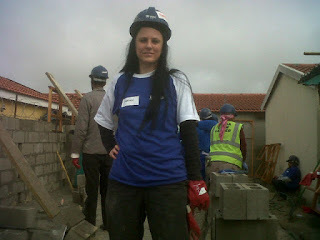 Builder chic for the coffin chick
Builder chic for the coffin chickNow *there's* something you don't see every day!
This might shock a few people, but I’m going to be upfront. I didn’t help to build a house for Mandela Day out of any altruistic sense of “being a good person”. I don’t feel like I owe anyone anything so that I feel compelled to “give back”. Yet when we received an e-mail request for volunteers to build a house for a family in Mfuleni with Habitat for Humanity, I didn’t even think twice. I put my name down.
Why?
Because this day would be spent outside of my comfort zone.
Since I spend most of my days in front of the computer, my only point of contact with the rest of the world is often only through my Twitter feed and the e-mails I receive. Sure, I work for a newspaper publisher so I do get to read the titles we publish, but there’s always a degree of separation. All this stuff I read about happens “out there”. Not here. The closest I get to seeing the “real world” is when I catch the train to and from work. But even there I’m insulated by the music I listen to and the fact that my nose is shoved in a book.
And sometimes it’s good just to remind yourself there’s a “real world” out there (and no, in my book shopping malls and visiting friends don’t count). This was my opportunity to go out and explore, gain new experiences.
Predictably, with my luck, the morning we set out in the staff taxi, it was raining, and by the time we reached Mfuleni, the weather hadn’t let up much. Bright spark that I am, I had not brought a jacket. (In my defence I’ll state that, until now, our winter has been very mild.) I needn’t have worried, however.
Our team leader, Linda, soon had us huffing and puffing for breath. First, after donning our hardhats and gloves, we had to help move piles of bricks. These cement blocks weigh several kilograms and, while the first two you manage to swing seem a breeze, try several hundred.
Next up was learning to mix the “dugga” or cement mixture that we had to use. For each batch we needed six wheelbarrows of building sand mixed with bags of cement and this was heavy going. Considering that we had a lone man in our team, we really had to put our backs into it.
What I found fascinating is that even though at first we kept bashing our spades accidentally, by the end of the day we’d learnt to anticipate each other’s movements and work as a team.
And we worked quickly, and hard. Tea time of vetkoek loaded with apricot jam – something I would never eat under ordinary circumstances – tasted absolutely heavenly. Short breaks aside, we focused on our goal: put up four walls consisting of eight courses of bricks, with door and window frames. Slowly but surely the random ingredients of cement blocks, wooden frames and piles of sand transmuted into something that was beginning to look like a house. That knowledge – of a target set and met – was worth the sweat and the aching muscles.
Hard work? Hell yeah.
Pushing little blocks of text and pictures around on a screen all day very rarely feels like work, even when I hold a newspaper in my hands afterwards.
I couldn’t ignore the team-building aspect either. While we started the day a bit stilted, we soon laughed easily and commiserated about our sore muscles or just took pride in what we’d achieved. I’m not the world’s greatest “buddy-buddy” kinda gal, but hell, I felt some of my ice melting towards colleagues I’ve sometimes wanted to cheerfully throttle.
But perhaps the most important reward from this day of work was chatting to the family whose house we were building, and sharing in their excitement. I’ve been a homeowner for almost a decade, and I reckon I take this for granted. Here, folks who have been living in a rusted corrugated shack are finally able to move into their own home. With a real roof. And real doors. And windows. One lady smiled with obvious pride in her gaze, and told me she was so happy she was getting her own room. That simple statement gave me pause for thought.
I don’t want to get all gushy and fluffy about “having done my bit” for Mandela Day. I feel that every once in a while, and for the right reasons you should do something you wouldn’t ordinarily do.
This wasn’t about proving to the world how good I am. It was about stepping outside of myself briefly to do something to create positive change. I reckon that’s what Madiba had in mind.
This piece initially appeared in the Life supplement of the Sunday Independent on July 22, 2012.
Published on July 24, 2012 12:33
July 23, 2012
Reading the Cards with LK Below #guest

As an author, I love weaving my knowledge into the books I write. In the case of my newest release, Beauty in His Bed, that knowledge is about Tarot cards. I've been reading tarot cards since I was fifteen years old. For those of you who don't know how readings work, allow me to enlighten you:
The reading starts with a question from the Querent, the person wanting the reading. This question can not be a yes or no question. It also must have a timeline. For instance, the question Amy asked in Beauty in His Bed is: "What will my future bring during my stay in New Orleans?"
Once the Querent knows the question, he or she thinks about it while shuffling the cards. This is to bring the cards in tune with the Querent's thoughts. Then the Querent returns the cards to the reader. They do not tell the tarot reader their question. This is so that the reader can be objective in reading what is in the cards, rather than seeing the most likely answer to the asked question.
The reader then turns over the cards in the desired layout. The layout used in Beauty in His Bed was a simple 3-card spread. The first card overturned represents the past. The second represents the present. And the third represents the future.
Amy's layout was this:
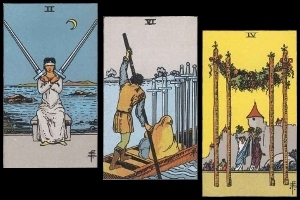
The first card, the two of swords features a blind-folded figure, meaning that the Quenent was once blind to something or someone. The second, the six of swords, shows the Querent sailing through choppy waters. This could mean they are running away from something, or towards something. The third card, the four of wands, indicates a celebration to come -- anything from a wedding to a housewarming party to a promotion to the celebration of an accomplishment.
Here's an excerpt of the reading:
After a minute, she looked up. “Has something turbulent happened to you recently?”
Flabbergasted, Amy felt her mouth drop open. She craned her neck to peer at the cards. Did they show that Tim had broken up with her? All she saw was a bunch of swords and staffs. What did that mean?
Danielle continued, “I only ask because of these cards.” She pointed at the first two. “This one, representing the past, is the two of swords. You see how the figure is blindfolded? That could indicate that you were once blinded to something or someone. Even so, based on the figure’s position, you also felt defensive. Maybe you’ve felt that way for a long time.” She moved on to the second card. “But here in the spot representing the present, you have the six of swords. It shows that you’re running away from something. See the choppy water on this side of the boat? You’re sailing from something bad into calmer waters. That could be the reason you’re here in New Orleans.”
Amy didn’t look at Monique. But she didn’t have to. Danielle was completely right--she was running from something. Her breakup.
When she didn’t say anything, Danielle pointed to the third and last card. This one was brighter than the others, with a yellow background and garland twining around four staffs. “This is your future, the four of wands. It indicates a celebration to come. Normally, this card means there will be a wedding in the future, but it could be any kind of party. A baby shower, a housewarming party, or even the celebration of an accomplishment.”
Unfortunately, Amy knew which one the card indicated. There would be a wedding in the future--it just wouldn’t be hers.
***
Do you believe in the power of tarot? Have you ever had a reading?
Beauty in His Bed is now available from Lyrical Press, Inc. Read more or buy it at http://bit.ly/BeautyInHisBed. Visit L.K. Below online at www.lbelow.net.
Published on July 23, 2012 11:50
July 20, 2012
#fridayflash The Blackfeather Chronicles, excerpt 2
Read the first excerpt here.
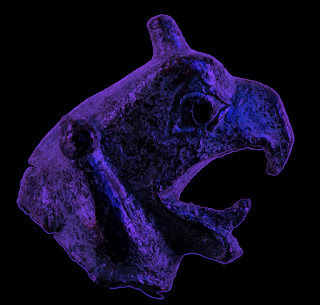 "I'm not so sure about this creature in our dwelling, daughter." Carolo leant heavily on his desk and regarded me from beneath a ferociously troubled frown.
"I'm not so sure about this creature in our dwelling, daughter." Carolo leant heavily on his desk and regarded me from beneath a ferociously troubled frown.I sat upright next to Anwyn's chair, my flank pressed tightly against her thigh. Her hand rested warm and solid on my shoulders by the wing joints-wings I kept tightly furled against my back. Why couldn't I have been born a wolf hound or a cheetah, or even a house cat for that matter, I don't know. I was a griffin. Or so everyone kept telling me.
Oh my goodness, what is that?
A griffin.
Does it bite?
I could recite those particular words like a mantra and, usually when I did, they elicited a startled response from the previously ignorant parties.
"He learns quickly, Father. He hasn't messed in the house at all, and he speaks. He's capable of reason." Anwyn's voice was warm honey and I leant into her touch.
"That's exactly the problem. You know how they are when it comes to the weres and the nightwalkers. They don't like 'em, and they're as near human as you can get. And guess why dragons are extinct, and unicorns might as well be too for all we see no hide nor hair of 'em. A talking walking griffin..."
Anwyn's fingers tightened. "And if we give him over to one of the temples? They will use him as a sacrifice or he'll end up in the Imperial menagerie to be poked and gawked at. He's a person, Father. Like you and me."
Carolo glanced down at me and his expression softened. "Aye, that I know." Then he returned his regard to his daughter. "That's why no one must know that he is gifted with reason. For all intents and purposes people must think him no more special than a well-trained cockatrice or basilisk. Enough tongues are wagging as it is."
I bristled at the thought. I was no dumb reptilian with a venomous sting or paralysing glare. But I understood the wisdom in Carolo's words, and anything that threatened to tear me away from Anwyn's side was to be avoided at all costs.
Carolo shifted a few scrolls on his desk, took a sip of wine then turned his full attention on me. He has a way of looking at all of me, for lack of better explanation, as if he could consider the present and delve deep into the future. Outside his office, beyond the latticed window frame the sounds of sparrows reached us. Within this hallowed space was only a heavy regard punctuated by the thudding of our pulses.
"Silas, would you be able to give the appearance of being no more than the average alchemical? At least just around strangers and when you accompany Anwyn outside the grounds. It is for the best."
This was the first time Carolo had ever addressed me as though I were another person, and I straightened. I had lived here in the villa for six months already and, up until now, my missus's father had only ever existed on the periphery of my life. Anwyn patted my shoulder. She meant to reassure me but my heart still thudded faster.
"I will, Father."
The man paled slightly and blinked rapidly, but then collected himself. What had I said wrong?
Anwyn cleared her throat and rose. "If I can take leave of you, Father. I need to go oversee the progress in the southern herb garden."
The man nodded briefly and whatever tension had built in the room fled. Anwyn straightened her stola and we left her father's office, and made our way to the south gate by crossing the main courtyard.
As soon as we were out of earshot, I asked, "Did I say something wrong?"
Anwyn paused and smoothed the down on my head. "Nothing you'd understand. I think perhaps Father is reminded of my brother. Both he and my mother passed away when he was born." Her sadness sparked off a pain in my chest, and I raised myself on my hindquarters so that I might be closer to her.
"I don't remember my mother," I told her. "It is terribly sad."
Her eyes glistened but she managed a small smile. "It is all right. I don't remember mine either."
Published on July 20, 2012 02:52
July 18, 2012
#review A Book of Horrors, edited by Stephen Jones
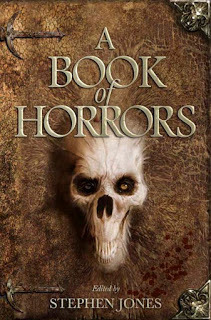
Title: A Book of Horrors
Editor: Stephen Jones
Publisher: Jo Fletcher Books, 2011
Buy link
WITH a stellar cast including the who’s who of classic horror, A Book of Horrors serves up a fantastic collection of stories from the likes of Ramsey Campbell, Peter Crowther, Dennis Etchison, Elizabeth Hand,
Brian Hodge, Caitlín R Kiernan, Stephen King, John Ajvide Lindqvist, Richard Christian Matheson, Reggie Oliver, Robert Shearman, Angela Slatter, Michael Marshall Smith and Lisa Tuttle.
Their writing is especially refreshing after the overdose of glittery vampires and torture porn so popular in media at present. If you’ve been looking for dark tales to provide a suitably gritty antidote, then A Book of Horrors is a worthy addition to your book collection.
And who better to put together this selection than the award-winning editor Stephen Jones?
Although greats such as King, Kiernan and Campbell need no introduction, a few stories leapt out at me. Slatter’s The Coffin-Maker’s Daughter flirted with the fear of unquiet dead, within the frame of the troubled relationship between a woman who is her coffin-making father’s heir.
A Child’s Problem, by Reggie Oliver, caught my attention, perhaps because of my fascination with the Victorian era’s fixation with death. That the story itself has a tale attached to it further adds to its mystique.
The protagonist’s approach to solving a tragic mystery within the grounds of a forbidding and often claustrophobic estate hit all the right buttons.
Elizabeth Hand’s Near Zennor delves into the realm of mystery and yet again there’s a story behind this tale, with the author investing a semi-autobiographical account in her writing. Then again, what’s not to love about a telling that blends present tragedy with the gradual uncovering of deeply buried secrets?
What particularly made this anthology for me was that the authors were given the opportunity to share some of the behind-the-scenes events that contributed to their creative process. Even better was the fact that I’ve now rekindled my love for existing favourites while adding a sprinkling of new names to my “to read” pile. All in all, this is a well-rounded collection offering a diverse palette, from the morbid to darkly mysterious. Definite fireside reading on a dark and stormy night.
This review first appeared in the Pretoria News on July 16, 2012.
Published on July 18, 2012 12:40
July 17, 2012
#travel A Whole Lot of Blarney
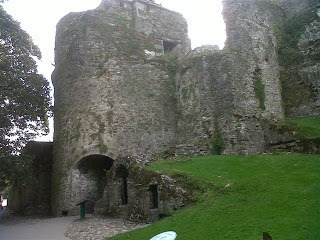 The sight that greets visitors as they approach the castle
The sight that greets visitors as they approach the castleSet in verdant grounds, Blarney Castle is every bit the tumbledown picture-book castle I'd imagined as a child. And I was so going to kiss the Blarney Stone - even though my husband evinced his disgust when I'd told him that was one of my goals during my visit to Ireland late last year. Hell, I needed some eloquence. In my 11 years of marriage I've yet to win an argument with the man.
As the name suggests, the castle is situated in Blarney, near Cork, and was built as a fortress about 600 years ago by Cormac Laidir McCarthy, Lord of Muscry. Apart from seeing ruined tower houses scattered throughout the Irish landscape, this was my first exploration of a castle other than the Castle of Good Hope back in Cape Town.
We approached through Blarney Castle's park-like grounds and crossed a clear stream. Here, past visitors had stood on the bridge to toss coins and, ostensibly, make wishes. This was just the start of the sense that we were on to something almost magical and out of a fairy tale. Blarney Castle itself rose from the land ahead of us, a towering edifice of grey stone that contrasted vividly with the surrounding trees' foliage. I couldn't help a small lurch of excitement as I approached the ruins. I'd always known castles were big, but, yikes, so tall? I craned my neck to stare up at the sky, and experienced a brief spot of vertigo as I saw the clouds seemingly tattered on the crenellations.
Later during my visit I'd get a chance to see the fully restored Castle Bunratty, which is similar in design to Blarney, but for now I had to use my imagination. Perhaps it was a product of having read far too many fantasy novels as a child, but a real European castle was nothing like I'd imagined it.
For one, it was actually pretty darn cramped if I had to consider how many people must have lived together. And it was difficult to visualise quite how the castle must have been hundreds of years ago because of the ruinous state.
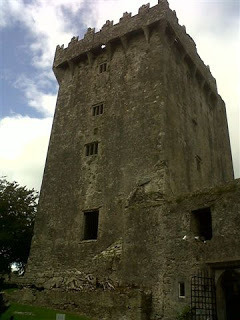 It's easy to get a sense of vertigo looking upI also tried to picture what the area surrounding the castle would have been like. Would I have heard the ring of steel from a blacksmith's anvil, smelt the unmistakable tang of peat smoke and seen the proud Irish, some on horseback, some on foot, coming and going on their daily errands?
It's easy to get a sense of vertigo looking upI also tried to picture what the area surrounding the castle would have been like. Would I have heard the ring of steel from a blacksmith's anvil, smelt the unmistakable tang of peat smoke and seen the proud Irish, some on horseback, some on foot, coming and going on their daily errands?But my musings on ancient times aside, of course I had to climb to the top of the actual castle. After all, I hadn't flown halfway across the globe to not complete my little adventure. But oh, going up was definitely not as easy as it sounds - and not only was this exercise vertiginous, but slightly claustrophobic as well. The stairs leading to the battlements where the Blarney Stone is situated are narrow and I'm convinced the people who built the castle were a helluva lot shorter than me. There were a few moments where I needed to duck my head, and I had to watch where I put my foot each time as I climbed the worn spiral stairs.
I had a peek into what would have been a bedroom and visualised how the rough stone walls would have been covered in tapestries and I had to wonder if these measures could take away some of the chill the stones no doubt carried during winter.
The view from the top, of course, is nothing short of amazing - green fields and trees as far as the eye can see - and even if you elect not to kiss the Blarney Stone for the gift of eloquence, it's well worth the mission just for where your gaze can roam.
According to history, the Blarney Stone is said to be half of the Stone of Scone from Scotland, upon which the Scottish kings were crowned.
It was given to Cormac McCarthy by Robert the Bruce in 1314. Later, when a certain Cormac Teige McCarthy gave Queen Elizabeth uphill, it's reported that she said that the man gave her "a whole lot of Blarney" - hence the origin of the term that's still in use.
My actual kissing of the stone was a bit of an anticlimax, but perhaps that's a good thing because before that, oh my... You have to lie down on your back, hold on to the iron railings while one of the assistants clings to your legs and... swing yourself head first under the battlements of the castle to reach the stone. And yes, you are horribly, awfully aware of that plunge on to the stony ground, many, many storeys below. People down there look teeny-tiny. Photographs are taken of you in this ungainly posture, but I opted not to pay the about R100 for my picture, content merely with the memory of the cold stone against my lips.
As for whether my wish came true, that would be telling now, wouldn't it?
 Blarney Castle's verdant groundsUnfortunately the day grew a bit cold and miserable, and our schedule was tight, so we tarried only a little in the grounds surrounding the castle.
Blarney Castle's verdant groundsUnfortunately the day grew a bit cold and miserable, and our schedule was tight, so we tarried only a little in the grounds surrounding the castle.Of particular interest to me was The Poison Garden filled with all manner of deadly plants, and a woodland walk that led to a brief investigation of nearby caves below the castle.
If we'd had more time, we would have visited the historical Blarney House itself, as well as had more time to fully explore more of the beautifully laid out gardens, the arboretum and The Rock Close. You need an entire afternoon here, definitely. When I eventually get my posterior back to Ireland, I'll pay a second visit to the castle with the stone that's been pressed to many, many lips.
This article appeared in the Sunday Independent Life supplement on July 15, 2012. All pictures by the writer. Nerine Dorman was a guest of Tourism Ireland. For further information about Blarney Castle, see www.blarneycastle.ie and for additional information about planning a visit to Ireland, see www.discoverireland.com/za
Published on July 17, 2012 12:53
July 16, 2012
#guest Time Keepers excerpt
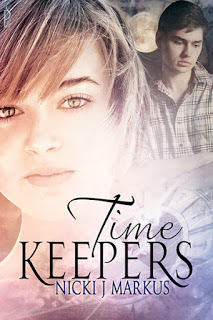 Today I welcome Nicki J Markus to my blog, and she's sharing an excerpt from her novel, Time Keepers. Welcome, Nicki!
Today I welcome Nicki J Markus to my blog, and she's sharing an excerpt from her novel, Time Keepers. Welcome, Nicki!* * * *
Say No To Fur!!
The poster caught his eye as he stood on the muggy, station platform waiting for the southbound Jubilee Line tube.
Nick frowned, tilting his head slightly and staring at it. The hologram of a wolf's head hovered in the centre, the trademark tinges of reds and greens, which even modern technology could not erase completely from the image, were just visible behind its charcoal grey fur. It rippled there in seeming innocence, a benign look in its yellow eyes as it watched the passers-by.
In some ways it seemed inconspicuous, lost as it was amidst the neon graffiti tags that covered every free inch of wall space, and yet it drew the eye somehow, creating a sense of disquiet that made everyone give it a wide berth as they walked past.
Then a woman stepped a little too close.
The wolf's head leapt out from the poster, eyes bloodshot and jaws open wide, revealing glistening pointed teeth that dripped with saliva and snapped viciously at her. The woman shrieked and jumped back in fright, dropping her handbag as the wolf retreated, reverting once more to its former pose.
Nick bent down and retrieved the worn leather bag, holding it out to her. He could hear the heavy pounding of her heart within her chest, and he waited patiently while she took a moment to compose herself. Finally her watery grey eyes focused on him, and she reached out a gnarled and wrinkled hand to reclaim her possessions.
"Thank you, young man." She carefully eased the handles of the bag back over her emaciated arm, the additional weight making her hunch her shoulders as she supported one arm with the other. "It shouldn't be allowed."
"No, the tube station really isn't the place for posters like that," he agreed with her readily, casting a wary glance at the wall where the wolf still hovered, looking peaceable once more.
"No, not the poster, young man; I mean these Werewolves—and the Vampires too. As if there isn't already enough wrong in the world without such evil creatures roaming around free. The sooner the Government stamps them out the better." The woman turned away and waddled off farther down the platform.
Blurb
In the not so distant future, Supernaturals have announced their presence to the world. But now a secret government agency is rounding them up, hoping to use them for its own purposes.
With Supernaturals going missing every day, Nick has been careful to guard his own secret, never giving anyone reason to notice him. That is until Ellie comes careering into his train carriage.
Instantly drawn to her, he tries to help. But soon both their secrets are revealed and they find themselves on the run in a desperate bid to escape from the mysterious Time Keepers, whose net is closing in around them.
About Nicki J Marus
Nicki J Markus was born in England in 1982, but she now lives in Adelaide, South Australia with her husband. She has loved both reading and writing from a young age and is also a keen linguist, having studied several foreign languages. She has completed a BA (hons) English with French from the University of Greenwich, London and a PGDip in Translation from the University of the West of England, Bristol. She is currently studying for diplomas in Editing and Publishing.
Nicki J Markus launched her writing career in 2010 and her fiction work has been accepted for e-book publication by both Wicked Nights Publishing and Silver Publishing.
In her spare time, Nicki J Markus also enjoys many other creative pursuits including music, theatre, photography, sketching and web-design. She also has a keen interest in history, folklore and mythology, pen-palling and travel.
Links
Website: http://www.nickijmarkus.com
Goodreads: http://www.goodreads.com/author/show/4567057.Nicki_J_Markus
Facebook: http://www.facebook.com/NickiJMarkus
Silver Publishing Author Page
Published on July 16, 2012 13:33
July 14, 2012
The Gates of Horn and Ivory, what the Prince of Dreams means to me
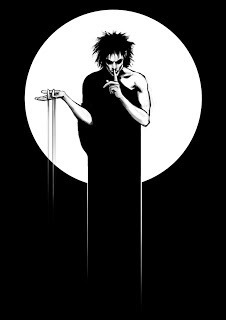 The first time I encountered Lord Morpheus was at the tender age of 18, when one of my fellow RPG buddies put a copy of one of the Sandman graphic novels in my hands. "Here, read this, you'll like it," Nenad said.
The first time I encountered Lord Morpheus was at the tender age of 18, when one of my fellow RPG buddies put a copy of one of the Sandman graphic novels in my hands. "Here, read this, you'll like it," Nenad said.Generally when people tell me I must read a book and that I'll like it, they have absolutely no idea about my particular tastes--but in this case Nenad was spot on. I didn't just like the Sandman's epic saga, I FUCKING LOVED IT. So much so that I don't even have to bat an eyelid when someone asks me about my favourite stories.
When it comes to masterful storytelling, Neil Gaiman, in my mind, rates right up there with JRR Tolkien. He *understands* storytelling the same way Joseph Campbell laid out the monomyth, and George Lucas brought us Star Wars.
Ever wondered why these stories leave us so, well, satisfied?
I believe they tap into the very essence of our unconscious hopes, dreams and desires. And Neil Gaiman's Sandman graphic novels visited with so many of the epic stories already in existence, almost as if he gave an eclectic "the story of everything" all wrapped one. The characters and story arcs are too numerous to mention, and an in-depth look is way beyond the scope of this blog post.
What Gaiman taught me, however, was to allow my imagination free rein, to look into the past and conceive of possible futures. He taught me that reality, in my fiction, is a malleable thing, and I can make up the rules as I go along, and write the kinds of stories that skirt around the edges of mystery then duck down pathways half-remembered from childhood, all wrapped up in the dreams of boundless possibility.
So, Neil, thank you for the Dream King, Lord Morpheus, and for offering me a glimpse into the power of dreams. And your fantastic news about the upcoming prequel, a quarter of a century since the beginning of this saga is as exciting as the day I held a printed copy of my first novel in my hands. Your way of looking at storytelling taught me so much about the power of imagination.
Published on July 14, 2012 04:57
July 12, 2012
#fridayflash The Blackfeather Chronicles, extract from chapter 1
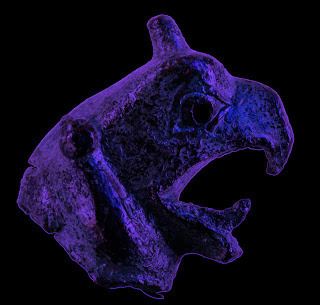 Picture: Wiki Commons/JastrowLike most of the strays the missus brought home, I was one of the many she rescued from the market. And I’ll remember that day for the rest of my life, better than I do the events surrounding my initial capture. For certainly, as one belonging to the proud race of griffins—and Ravenkin no less—I should have some remembrance of a nest, of siblings and a mother. But, alas, those memories remain locked away.
Picture: Wiki Commons/JastrowLike most of the strays the missus brought home, I was one of the many she rescued from the market. And I’ll remember that day for the rest of my life, better than I do the events surrounding my initial capture. For certainly, as one belonging to the proud race of griffins—and Ravenkin no less—I should have some remembrance of a nest, of siblings and a mother. But, alas, those memories remain locked away.The basket was small enough that I couldn’t turn, and the scraps of linen lining it soiled by my own waste. Terrible hunger blinded me to all reason—not that a griffin cub was wont to expressing any rational thought—but when I looked into Her eyes, the ravenous fires died back and, I’m later told, I stopped the incessant squawking and yammering with which I’d apparently been painting the very air blue.
Petite Anwyn had eyes like lapis lazuli, and her skin was bronzed—not from the sun but partially, as I later discovered, due to her foreign mother. And her hair. I always loved her hair—the palest gold, like corn silk. Eventually I would understand that her complexion was far too unusual to be considered attractive, but at that moment I gazed upon her face and I was lost. Some dim griffinish race memory stirred a resonance within me and I craned my neck so that I might be closer to her.
Her gaze was filled with compassion and I knew at that moment, even as I do now, that I belonged to her. Forever.
She didn’t have to haggle long to liberate me from the beast-seller. In hindsight I reckon the man felt, at that point, that he was well rid of me—a noisy, messy nuisance. Had he known my sheer magnificence once I’d fledged, he might have driven a harder bargain.
An unfledged griffin cub, I can guarantee, is nothing much to look at. Anwyn made many sketches of me when I first came into her care. A wide gape, almost bulbous eyes. Kittenish hindquarters unbalanced with the forequarters of a bird. Stumpy wings. Instead of glossy black feathers, I boasted a mess of vaguely charcoal-hued fluff. At this early age no one could really tell whether these would turn out to be pelt or plumage.
Griffins were almost unknown back then—and still remain rare—but when I was a mere cub no one knew enough about my race to know what to do with me. If Anwyn hadn’t come along I might’ve been pecked to death by the brace of basilisk hatchlings in the cage next to me or ended up in one of the labourers’ cookpots.
Instead I was given a name, a very fine name I might add—Silas Blackfeather—and took up residence in a small villa on the outskirts of the great city of Anfi, in the foothills of the Makarra mountains.
Anwyn had a way with strays, and in her care I flourished, and it was very soon apparent to her that the latest addition to her already considerable menagerie was more than just a beast, or indeed one of the magical sports. Neither she nor her father had expected that I numbered among those gifted with reason.
I will admit that at that stage of my life I did not possess a whole lot of reason, but when I called her “mama”, it brought her up short. The rest, as they say, was history. Once I started talking, no one could really shut me up.
Now Anwyn lived with her father, Carolo, who was a slave master. Not one of these big awful sods who dealt in gladiators or bed servants, but a peaceable, average middle-of-the-road master, who specialised in the kinds of slaves who would cook in kitchens, or create and maintain garments or teach children their letters. Most of these luckless folks were often in debt, and one way for them to alleviate the problem would be to sell themselves into servitude so their younglings were better off.
Or Carolo would visit the market and he’d examine the wares. He had an eye for quality. Just like his daughter. They could both see past a rough exterior. One slave master’s runaway became Carolo’s next prized carpenter.
Before you get all uppity with me about the slave trade being bad and all, please take a moment to consider what society was like back in the days of the Old Empire. Yes, there were rich folks who treated their slaves badly but, often, in many cases, slaves were prized possessions, especially if they were skilled, and were treated better than many free men who often went to sleep with empty bellies. A good master cared for his household. He would not want to see his horse lame, nor would he mistreat the slave who raised his children.
Carolo was a good master.
Published on July 12, 2012 15:13



